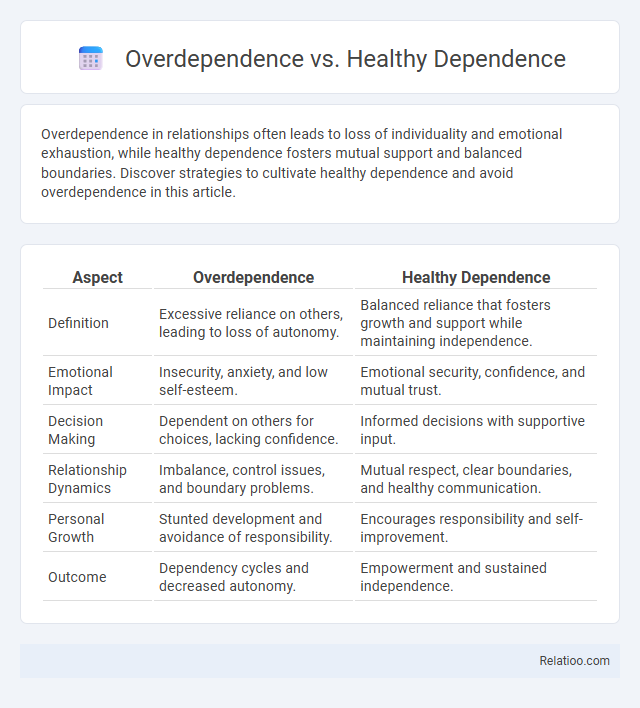Overdependence in relationships often leads to loss of individuality and emotional exhaustion, while healthy dependence fosters mutual support and balanced boundaries. Discover strategies to cultivate healthy dependence and avoid overdependence in this article.
Table of Comparison
| Aspect | Overdependence | Healthy Dependence |
|---|---|---|
| Definition | Excessive reliance on others, leading to loss of autonomy. | Balanced reliance that fosters growth and support while maintaining independence. |
| Emotional Impact | Insecurity, anxiety, and low self-esteem. | Emotional security, confidence, and mutual trust. |
| Decision Making | Dependent on others for choices, lacking confidence. | Informed decisions with supportive input. |
| Relationship Dynamics | Imbalance, control issues, and boundary problems. | Mutual respect, clear boundaries, and healthy communication. |
| Personal Growth | Stunted development and avoidance of responsibility. | Encourages responsibility and self-improvement. |
| Outcome | Dependency cycles and decreased autonomy. | Empowerment and sustained independence. |
Understanding Dependence: Definitions and Types
Understanding dependence involves recognizing the distinctions between healthy dependence, overdependence, and underdependence, each impacting relationships and personal growth differently. Healthy dependence supports mutual support and trust, fostering resilience and collaboration, while overdependence leads to excessive reliance on others, potentially hindering independence and self-efficacy. Your ability to identify these types enables balanced interactions and promotes emotional well-being.
The Psychology Behind Dependence
The psychology behind dependence explores the fine line between healthy dependence, where individuals effectively rely on others for emotional support and collaboration, and overdependence, characterized by excessive reliance that hinders personal growth and autonomy. Healthy dependence fosters secure attachment patterns, promoting resilience and balanced interpersonal relationships. Overdependence often stems from underlying insecurities or attachment disorders, leading to maladaptive behaviors and reduced self-efficacy.
Signs of Overdependence in Relationships
Signs of overdependence in relationships include excessive need for constant reassurance, inability to make decisions without partner's input, and neglecting personal goals or social connections. Overdependence often leads to emotional exhaustion, loss of self-identity, and increased anxiety about abandonment. Healthy dependence balances mutual support and individual autonomy, fostering trust without compromising personal boundaries.
Characteristics of Healthy Dependence
Healthy dependence involves trusting others while maintaining personal autonomy, fostering mutual support and emotional resilience. Characteristics include clear boundaries, effective communication, and balanced interdependence without sacrificing your individuality. This type of dependence promotes growth and well-being, contrasting with overdependence, which often leads to reliance that undermines self-efficacy.
Causes and Triggers of Overdependence
Overdependence often stems from underlying insecurity, fear of failure, or past trauma that triggers an excessive need for reassurance and support. You may become overly reliant on others when coping mechanisms are weak, leading to impaired decision-making and reduced self-efficacy. Identifying these triggers and cultivating healthy dependence promotes autonomy while maintaining supportive relationships.
Emotional and Social Consequences of Overdependence
Overdependence often leads to emotional instability, characterized by anxiety and low self-esteem, as individuals rely excessively on others for validation and decision-making. Socially, overdependence can result in damaged relationships due to feelings of suffocation experienced by peers or partners, potentially triggering resentment and isolation. In contrast, healthy dependence supports emotional resilience and balanced social interactions by fostering mutual support without compromising individual autonomy.
Benefits of Healthy Dependence for Personal Growth
Healthy dependence fosters interdependence by balancing self-reliance with seeking support, leading to improved emotional resilience and social connectedness. Unlike overdependence, which can hinder autonomy and growth, healthy dependence encourages collaborative problem-solving and the development of trust in relationships. This balanced reliance enhances personal growth by promoting adaptive coping strategies and reinforcing a strong sense of self within a supportive network.
Setting Boundaries: Moving from Overdependence to Balance
Setting clear boundaries is essential for transitioning from overdependence to a balanced, healthy dependence in relationships. Establishing limits on emotional and practical support fosters autonomy while maintaining mutual trust and respect. Consistent boundary-setting prevents the pitfalls of overdependence, promoting personal growth and interdependence.
Strategies to Foster Healthy Dependence
Strategies to foster healthy dependence emphasize establishing clear boundaries, promoting open communication, and encouraging mutual respect in relationships. Implementing regular check-ins and active listening techniques helps maintain balance between support and independence. Cultivating emotional self-awareness and setting realistic expectations also prevent the pitfalls of overdependence and underdependence.
Cultivating Independence alongside Connectedness
Cultivating independence alongside connectedness requires balancing healthy dependence, where mutual support fosters growth and resilience, against overdependence, which undermines autonomy and personal development. Healthy dependence promotes emotional security and collaborative problem-solving without diminishing self-efficacy, whereas overdependence leads to reliance that stifles individual decision-making and confidence. Prioritizing this balance enhances interpersonal relationships while empowering individuals to maintain self-sufficiency and adaptability.

Infographic: Overdependence vs Healthy Dependence
 relatioo.com
relatioo.com